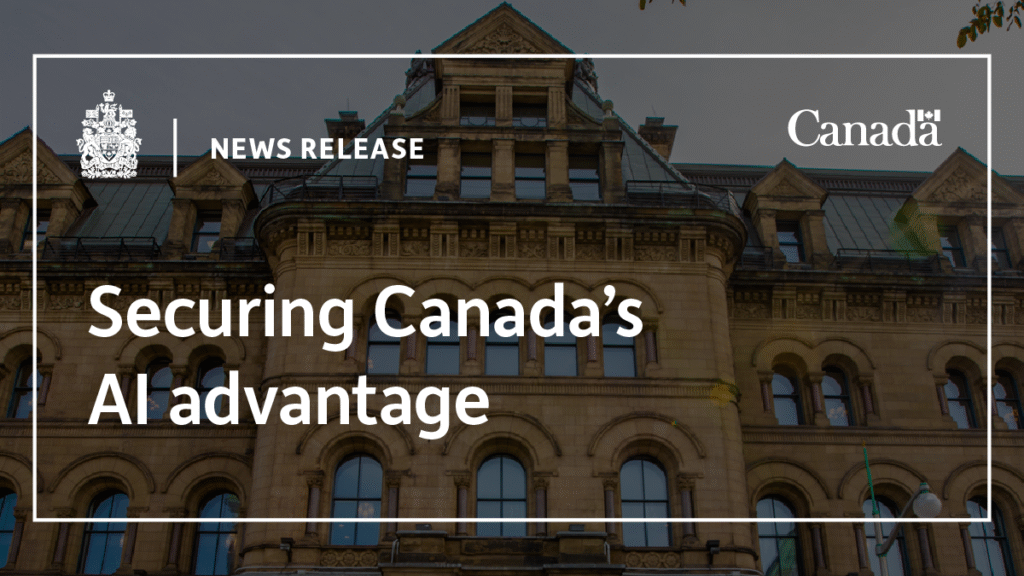Artificial Intelligence (AI) is transforming Canada’s innovation landscape, and governments at every level—federal, provincial, and municipal—are actively investing in AI adoption, commercialization, and research. For entrepreneurs building AI-driven products or integrating machine learning into existing systems, non-dilutive funding (grants, subsidies, and contributions) can dramatically accelerate development while preserving equity.
This comprehensive guide covers the top Canadian grants for AI startups, including national programs, Ontario-specific initiatives, regional funds, innovation clusters, tax credits, and expert strategies to secure funding.
Why Canada Is Funding AI in 2025
Canada aims to position itself as a global AI leader. With hubs in Toronto–Waterloo, Montreal, Vancouver, and Ottawa, the country has become a magnet for AI research and applied innovation.
Government funding is focused on:
- Supporting responsible AI adoption
- Boosting compute capacity for startups
- Commercializing AI products and IP
- Helping SMEs integrate AI into operations
- Strengthening domestic AI talent
- Competing globally in advanced technologies
For founders, this is one of the best times to secure non-repayable grants, repayable contributions, and subsidized innovation support.
1. Federal Grants & Funding for AI Companies in Canada
1.1 AI Compute Access Fund (Government of Canada)
A newly launched national program helping startups and SMEs access high-performance computing (HPC) for training, deploying, and scaling AI models.
What It Offers
- Free or subsidized access to compute resources
- Supports generative AI, ML workloads, simulations, and model training
- Reduces cloud and compute costs for AI companies
Best For
AI startups with compute-heavy workloads (large models, vision systems, analytics).
1.2 Regional Artificial Intelligence Initiative (RAII)
A $200 million, five-year federal initiative supporting AI development and adoption across Canada.
Delivered regionally by:
- FedDev Ontario (Southern Ontario)
- PrairiesCan
- PacifiCan
- CED Quebec
- ACOA (Atlantic)
Two Funding Streams
- AI Productization & Commercialization
For startups building AI solutions, platforms, SaaS products, and applied research. - AI Adoption
For SMEs integrating AI into operations, manufacturing, logistics, or business processes.
Funding Amounts
- Up to 50% of project costs
- $500,000–$5 million+ depending on region
- Primarily interest-free repayable contributions
1.3 NRC IRAP – AI Assist Program
One of Canada’s most founder-friendly funding programs.
What IRAP AI Assist Provides
- Funding for AI R&D, prototyping, and technical validation
- Dedicated IRAP advisors (ITAs) to guide development
- Salaries for engineers, data scientists, and AI researchers
- Non-repayable grant support for innovation projects
Typical Funding Range
- $50,000 to $500,000 per project
- Startups with strong technical teams may receive multiple phases of funding
1.4 Scale AI (AI Global Innovation Cluster)
One of Canada’s five global innovation clusters focused on AI for supply chains, automation, and productivity.
What Scale AI Funds
- AI adoption projects in enterprise supply chains
- Industry–startup collaborations
- Accelerator programs supporting AI startups
For Startups
While Scale AI does not directly give grants to startups, it funds accelerator programs that then support startups financially and strategically.
Ontario accelerators supported include:
- DMZ – Supply AI Program (Toronto)
- ventureLAB Accelerate AI (Markham)
1.5 Strategic Innovation Fund (SIF)
A federal innovation program supporting large-scale AI and deep-tech initiatives.
Ideal For
- Scale-ups
- Companies building strategic AI infrastructure
- Mid- to late-stage firms with multimillion-dollar R&D roadmaps
Funding
- Up to 50% of eligible project costs
- Grants + repayable contributions
- Projects usually $3M+
2. Ontario AI Grants: Provincial & Regional Programs
Ontario is home to Canada’s largest AI startup ecosystem, and offers multiple funding pathways.
2.1 FedDev Ontario – RAII (Regional Artificial Intelligence Initiative)
The Ontario arm of the national RAII program.
For AI Startups
- Funding for commercialization and scaling
- Up to $5 million in support
- Focus on job creation and regional economic impact
2.2 OCE / OCI (Ontario Centre of Innovation) Programs
Although programs evolve yearly, recurring AI-friendly grants include:
- VIP (Voucher for Innovation & Productivity)
- OCI Market Readiness Program
- Industry–Academic Collaboration Vouchers
These often support:
- AI model development
- Testing & validation
- Commercial pilots
- Collaboration with universities and research institutes
Funding ranges: $25,000 to $250,000 (often matched contributions).
2.3 Ignite AI (IION – Northern Ontario)
A non-repayable grant supporting AI adoption and development in Northern Ontario.
Funding
- Up to 50% of costs
- Up to $20,000 or more depending on the intake
Eligible Expenses
- AI licensing
- Data engineering
- Third-party development
- Cloud services
- AI integration work
Ideal for early-stage AI projects.
2.4 Municipal Grants for AI in Ontario
Some Ontario cities offer innovation grants, often tied to business expansion or digital transformation.
These vary, but common municipalities include:
- Toronto – through Toronto Global / city innovation programs
- Ottawa – Invest Ottawa tech grants
- Hamilton – innovation ecosystem programs
- Markham – digital modernization grants via partners
- Waterloo Region – Communitech funding programs
Specific amounts differ by municipality, but often range $5,000–$50,000.
3. Tax Credits for AI Companies in Canada
While not a grant, tax credits often provide larger non-dilutive support than grants.
3.1 SR&ED (Scientific Research & Experimental Development)
Canada’s #1 R&D tax credit.
What It Covers
- AI algorithm development
- Dataset engineering
- Model training experiments
- Software engineering for uncertainty-based R&D
- Salaries, contractors, and technical overhead
Refund Rates
- Up to 65% refund on eligible labour costs
- Startups can receive cash back, not just credits
Nearly every AI startup in Canada qualifies for SR&ED.
3.2 Digital / cybersecurity tax credits (varies by province)
Ontario and other provinces periodically launch digital adoption credits that may include AI projects.
4. University-Linked AI Innovation & Funding Support
If your AI company collaborates with a university or research institute, additional funding may be accessible, such as:
- MITACS Accelerate (subsidized internships)
- NSERC Engage Grants
- AI research partnerships with Vector Institute (Toronto)
- Collaboration with Mila (Montreal) or Amii (Edmonton)
These programs can cover:
- Graduate researchers
- Data scientists
- Prototype development
- Applied research projects

5. How to Know Which AI Grant Is Right for Your Company
Best Grants for Early-Stage AI Startups
- IRAP AI Assist
- Ignite AI (Northern Ontario)
- OCI Market Readiness
- University-linked programs (Mitacs, NSERC)
Best Grants for Scaling AI Products
- RAII (Productization)
- FedDev Ontario programs
- Scale AI partnerships
- SIF (larger projects)
Best Grants for Businesses Adopting AI
- RAII (Adoption stream)
- Provincial digital modernization grants
- Municipal innovation grants
| Program | Funding Amount | Type | Who It’s For | What It Funds | Best For |
|---|---|---|---|---|---|
| AI Compute Access Fund (Canada) | Free or subsidized access to HPC/compute | Grant (in-kind credits) | SMEs, AI startups, research-driven companies | High-performance computing, AI/ML training, model deployment | Compute-heavy AI development & generative AI startups |
| Regional Artificial Intelligence Initiative (RAII) (FedDev Ontario, PrairiesCan, PacifiCan, etc.) | $500,000 – $5M+ (up to 50% of costs) | Repayable contribution | SMEs building or adopting AI | Productization, commercialization, AI adoption projects | Scaling AI products & enterprise-level integrations |
| NRC IRAP – AI Assist Program | $50,000 – $500,000+ | Non-repayable grant | Innovative SMEs with internal tech teams | AI research, prototype development, engineering salaries | Early-stage R&D, ML experimentation, technical validation |
| Scale AI Cluster Funding | Varies by program (typically up to 50%) | Cost-sharing grant | Enterprises, accelerators, research collaborations | AI supply chain projects, accelerator programs | Startups in accelerators or companies applying AI to supply chains |
| Ignite AI (IION – Northern Ontario) | Up to 50% of costs (approx. $20,000+) | Non-repayable grant | Companies in Northern Ontario | AI tools, licenses, integration, consulting, R&D | Early-stage AI adoption & prototype development |
| Ontario Centre of Innovation (OCI) Grants (VIP, Market Readiness, Collaboration Vouchers) | $25,000 – $250,000 | Grant / cost-share | Ontario-based SMEs | Commercialization, prototyping, industry–academic partnerships | Startups validating AI solutions or partnering with universities |
| Strategic Innovation Fund (SIF) | Millions+ (up to 50% of project) | Grant + repayable contribution | Mid-to-large scale tech companies | Large AI infrastructure, major research, automation | Scale-ups with big R&D budgets |
| SR&ED Tax Credit | Up to 65% refund on technical labour | Tax credit / refundable | Any Canadian company doing R&D | AI experiments, model development, engineering work | All stages — especially early-stage AI R&D |
| Municipal & Regional Innovation Grants (Toronto, Ottawa, Waterloo, Markham) | $5,000 – $50,000+ | Grant | Local SMEs | Digital transformation, AI adoption, modernization | AI adoption for local businesses & early innovation |
6. Tips to Increase Your Chance of Grant Approval
- Have a clear technical roadmap
Show data sources, model approach, risks, and validation steps. - Highlight commercial impact
Revenue forecasts, target markets, customers, and scalability. - Show job creation or regional economic benefits
This is critical for federal/provincial programs. - Demonstrate technical capability
Strong team = higher IRAP and RAII approval likelihood. - Include partnerships
Universities, enterprise pilots, or accelerators strengthen your application. - Prepare a realistic budget
Grants often favor projects with co-investment and clear milestones.
7. Final Thoughts: Canada Is One of the Best Places to Build an AI Company
Between:
- federal programs (RAII, IRAP, AI Compute Fund)
- provincial programs (OCI, FedDev)
- regional programs (Ignite AI)
- innovation clusters (Scale AI, Vector Institute)
- tax credits (SR&ED)
Canada offers one of the strongest AI funding ecosystems in the world.
With AI adoption accelerating across all industries, entrepreneurs who strategically leverage grants and incentives can build faster, de-risk development, extend runway, and scale globally without giving up equity.





